#yes yes i know conflict narrative etc etc let me have this
Explore tagged Tumblr posts
Text
what if they fall ? but my darling what if they fly !
Ed can COOK and he finds manual labour comforting and healing as long as it’s sufficiently stimulating. He also appears to be GOOD at these things. He’s gonna be fulfilled AF.
Stede can bring a touch of charm and whimsy and grace to anything. Whether that’s plating food or omg can you imagine the copy that’s about to spout forth from a man who argued that literally half a stone archway broken down outside is rustic with great ventilation.
They’re very good at delegating and recognising each other’s strengths
They’re very good at creating a mutually supportive if slightly unconventional workplace culture, and people in the service industry will literally owe you a life debt if you their employer treat them like a human person on occasion. to quote our lord and saviour lucius spriggs the bar is on the ground
We *know* because canon showed us that Stede’s strengths make up for Ed’s gaps in terms of ability to tolerate knobheads perform customer service. Would also LOVE to see several montages of Tolerating Knobheads Practice.
The weird cottage industry side business magnet that short term small business accommodation tends to form - especially The Inn Formerly Known As Blackbeard's Bar And Grill And Other Delicacies And Delights And Fishing Equipment - gives them just ridONKulous opportunities for self discovery
--- I’m not saying I’ll cry if they get a horse and it has kind eyes but I definitely will , and it will also remind me of Stede and his daughter and reconnecting with good memories from back then. Maybe they just use it for supply runs, maybe they do pony rides for little kids. Maybe he used to think it was just a good excuse for alone time but does he actually ?? have hobbies?? Is he??? Discovering things about himself outside of both toxic extremes??
--- Ed sings. And plays the piano. Maybe it becomes part of the fare at the inn or maybe it’s just for him and Stede. Either way I’d like to see him pick up music again
--- Calypso II Electric Boogaloo, also can I get a regular drag bingo night in this establishment??
--- They try making soap. Shoutout to Rotorua soap
--- Recreation of That One Scene from Ghost?
--- We find out Stede can garden and he's as surprised as the rest of us to learn this.
#blackbonnet#gentlebeard#ofmd#our flag means death#ofmd s2#ofmd spoilers#yes yes i know conflict narrative etc etc let me have this
56 notes
·
View notes
Text
How to Write a Character
For creative writing to have as deep an impact as possible, you need to give the reader strong characters they can relate to on a personal level.
By borrowing from tried-and-true character archetypes and giving them your personal spin, you can create heroes, villains, and sidekicks that will affect your readers as if they were real people they knew.
Come up with a backstory
Crafting a backstory can help you flesh out an interesting character profile.
“When I’m dealing with characters,” says legal thriller author David Baldacci, “and I’m trying to explain somebody's situation and motivations, you have to look into their past, because [the] past always drives motivations.”
Ask what experiences your character had in elementary school or high school that shaped who they are today. Your character’s backstory can greatly inform your plot.
Develop a character arc
A character must evolve throughout a story.
“The character has to change,” insists crime fiction writer Walter Mosley. “The character doesn’t have to become better. The character doesn’t have to become good. It could be the opposite. He could start good and become bad. He could start off hopeful and end up a pessimist. But he has to be impacted by this world that we’re reading about.”
Plan out your storyline based on your character's goals and how achieving or not achieving them will change them as people. This sort of template can help anchor your narrative.
Do research
If you plan to set your story in a specific locale or period, do enough research to make your characters seem true to life and believable.
“What does it mean, for instance, in the Tudor era to be a male person?” asks Margaret Atwood, author of The Handmaid’s Tale. “What does it mean to be a female person? What do those things mean when they’re at different social levels?”
Empathize with your characters
No matter what the type of character you’re developing, try to find some reason you and your reader can relate to their internal conflict.
“You’re living with these people every single day for months at a time—in some cases, years at a time,” says acclaimed children’s author Judy Blume. “You had better feel for them. So, for me, yes, I have great empathy for them.”
When people can empathize with characters, they’re more likely to find them compelling.
Experiment with different approaches
If you usually write characters from a particular point of view (or POV), change things up to challenge yourself.
“Write about someone entirely through the eyes of their friends and family,” suggests journalist Malcolm Gladwell. “So do a profile of someone where you deliberately never talk to the person that you’re profiling.”
There are plenty of ways to craft compelling character descriptions—free yourself up to try new alternatives.
Give your characters flaws
To craft believable characters, you need to give them flaws.
“One, it makes the characters human, just by default, because everybody recognizes that we all have flaws and mistakes,” David says. “But two, it gives you plot elements and plot opportunities because somebody makes a mistake. Why? Because they’re flawed.”
Learn from real people
Pay attention to real people’s mannerisms, personality traits, body language, and physical appearances.
Do research, and be respectful, when you want to write characters with backgrounds that you are not familiar with. Become familiar with different people's cultures, sexual orientations etc.
Talking to people about their experiences will help form your character’s personality.
Let your characters surprise you
Character development can proceed down a host of different avenues.
“Spend a lot of time with your characters and getting to know them,” Judy suggests. “And the way that you get to know them can be different from the way I get to know them. But my way is: They don’t come alive until I write about them, until I put them down on paper.”
As you write, your character’s motivation or perspective might change from what you originally planned.
Play characters off each other
Ask yourself how a secondary character’s personality might thwart the main character’s motivation.
“One of the best ways, as I said, to develop a character is to put that character in relationship to another person,” Walter says. “So as they talk, as they fight, as they work together, we find out more about who they are and what they are.”
The character’s close friends, adversaries, and acquaintances might all have different effects on their behavior.
Take an organic approach
Over the course of the story, be ready for your characters to surprise you as much as the people you know in real life might, too.
Your characters may take on a life of their own.
Avoid static characters by letting yours have their own lives and personalities. Let their stories take you where they lead.
Writing Notes & References
#writeblr#character development#writing notes#fiction#booklr#dark academia#light academia#creative writing#studyblr#lit#original character#on writing#writing prompt#writing advice#writing tips#writing reference#writing resources
879 notes
·
View notes
Text
The OTHER type of Star Wars fan
We've already covered (through this longer post and this addendum) that research shows George wasn't that involved or interested in the derivative material of the Star Wars franchise, also known as the Expanded Universe (EU). Aside from approving a few points, he let Howard Roffman and Lucasfilm Licensing handle it.
He is the first to say that he ain't as knowledgeable about Star Wars lore as we fans are.
Thing is... he's also not as passionate as we are.
Recently, I was watching some Q&A videos of George R.R. Martin, the author of Game of Thrones... and it occurred to me:
Martin is what most Star Wars fans wish Lucas was.
Think about it.
He's a talented writer who likes to focus on morally "gray" characters and complex political plotlines,
who created a series of novels for a mature audience in which his narrative merely asks questions and lets the reader draw their own conclusions,
knows and engages in the lore behind his creation and will often respond to those lore-heavy questions, and has gone on record stating that canon is the glue that holds a story together and keeps it coherent.
Contrast that with George "continuity is for wimps" Lucas, who:
Wrote a movie franchise which is also, partially, political... but he makes it for kids, and he's explicit about how this is thematically a clear-cut story about how the conflict of "good vs evil" is really about "compassion vs greed",
with flat dialogue, boring cinematography,
and whose approach to lore and canon can be summed up in his answer to how Anakin got his scar:
"I don't know. Ask Howard [Roffman]. That’s one of those things that happens in the novels between the movies. I just put it there. He has to explain how it got there. I think Anakin got it slipping in the bathtub, but of course, he's not going to tell anybody that." - Pablo Hidalgo’s set diary, August 2003
And as a Star Wars fan, I will admit that some of his casual retcons felt disrespectful, growing up.
"Boba Fett is NOT Mandalorian?!"
I had the same reaction when I saw an interview of Kathleen Kennedy stating she was a fan of Star Wars... from a filmmaking perspective. That seemed like such a finagling cop-out for me, at the time.
"Just say you're not a real fan, God!"
And it's easy to divide it in two camps, like that. You have 1) the fans, who will delve into deep lore, and you have 2) the average moviegoer.
But looking back on it... holy shit, that is actually a completely valid way of being a Star Wars fan.
Yes, Star Wars is a transmedia franchise, it's books, it's video-games, it's deep lore, it's lightsabers and Jedi and Sith and bounty hunters and Ewoks and Jabba and High Republics and Tython and Revan etc.
But before it was that, Star Wars was a filmmaking revolution. A juggernaut of innovation for the silver screen that inspired most of today's filmmakers.
So, sure, George Lucas isn't an avid lore-loving Star Wars fan like you and me. But he is a movie fan.
"I'm not that passionate about this story. I like it, it's fun and I enjoy doing it. But it's definitely not my life. I'm a bigger movie fan than I am Star Wars fan. I like making movies. At the end of nine years of making Star Wars, I was not ready to continue it. I was completely burned out on it. I was more passionate about raising my kids than making movies and especially making Star Wars. So I made other kinds of movies and TV shows and advanced the technology I needed. It's not a matter of passion. My passion is for filmmaking. I'll go and do filmmaking that is easier to do, where you can realise your ideas better. And nine years is a big part of your life, and to commit to another nine years, I didn't wanna do that right away." - EMPIRE, 1999
And you can tell this, when you watch the Star Wars films.
There are honestly so many homages and interesting filmmaking techniques, peppered throughout the six films, which only a nerd for cinema history like George would know how to implement.
C3-PO being based on the droid from Metropolis (1927) is a perfect example of this.
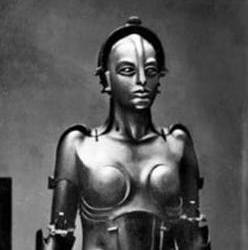

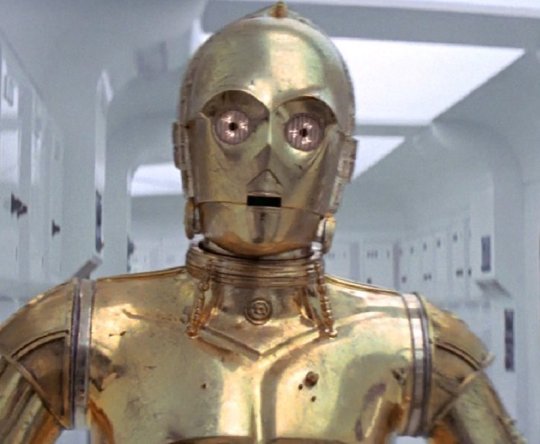
And that's interesting.
Because there's essentially this entire other dimension to the films, where it's not just the story unfolding, but to filmmakers it's also a series of techniques that make them go "I wonder how they did that!" or homages that make them go "OH! I know where that's from!" like we do when an comics characters appears in live-action.
Here's other examples:

CINEMA HOMAGES
All of Star Wars is absolutely littered with homages to cinema history.
I mean, you may already know this, but Flash Gordon is what George originally wanted to shoot, but the copyright holders said they only wanted Fellini to direct it (ironically, George wasn't artsy-fart enough for them). So he decided to write Star Wars instead.
As such, the inspiration from Flash Gordon is also present visually and spiritually throughout the two trilogies.

"It was like a Republic serial, a 1930s-style matinee adventure. The idea was that you came in, saw Episode IV, had missed the first three episodes, and wouldn't get to see the rest of it." - Starlog Magazine #300, 2002

The dialogue that a lot of people refer to as "campy" and "flat" is actually a mix of George being an experimental filmmaker who doesn't give much of a fuck about dialogue (and is by his own admission, not the best at it)...
"I'd be the first person to say I can't write dialogue. My dialogue is very utilitarian and is designed to move things forward. I'm not Shakespeare. It's not designed to be poetic. It's not designed to have a clever turn of phrase. [...] I just wanted to get from point A to point B. This film doesn't lend itself to that sort of thing because it's not about snappy one-liners. I think that Lethal Weapon-style dialogue is overused, it's a necessary aspect of high action films where you have to have the smart retort. You have to say "I'll be back baby" and stuff. It's not my style. It takes away from the integrity of the movie. [...] I'm aware that dialogue isn't my strength. I use it as a device. I don't particularly like dialogue which is part of the problem." - EMPIRE, 1999
... which is convenient, because it helped him simulate the dialogue of 1930s matinee serials, such as Flash Gordon.
"Let’s face it, their dialogue in that scene is pretty corny. It is presented very honestly, it isn’t tongue in cheek at all, and it’s played to the hilt. But it is consistent, not only with the rest of the movie, but with the overall Star Wars style. Most people don’t understand the style of Star Wars. They don’t get that there is an underlying motif that is very much like a 1930s Western or Saturday matinee serial. It’s in the more romantic period of making movies and adventure films. And this film is even more of a melodrama than the others." - Mythmaking: Behind the Scenes of Attack of the Clones, 2002
But beyond that, literally it's everywhere.
The scene where Palpatine ascends to being Emperor as Anakin slaughters his political rivals parallels the final scene in The Godfather, where Michael becomes the Don while his goons do the same thing.
This video compiles all the tributes beautifully. Check it out.
youtube
Even The Clone Wars has whole episodes that are direct homages to cult classics. The Zillo Beast episode is a clear reference to Godzilla, the episode The Wrong Jedi is inspired by The Wrong Man, etc.

"CINEMA VÉRITÉ" CINEMATOGRAPHY
I've already written a whole post (one of my favourites) showing how his fascination with cinéma vérité documentaries is reflected in the cinematography of all six Star Wars films, and it's part of what makes the entire franchise feel so immersive.
You can check it out here:

KUROSAWA
We've gone over how he's a big fan of Akira Kurosawa, and how big an influence Hidden Fortress was on both the Star Wars trilogies...
... but so is the mise-en-scène and the way George approaches production design. The reason Star Wars feels so "lived in" is also a lesson George learned from Kurosawa, which is that by making everything just a bit off-kilter, a bit dirtied-up and imperfect...
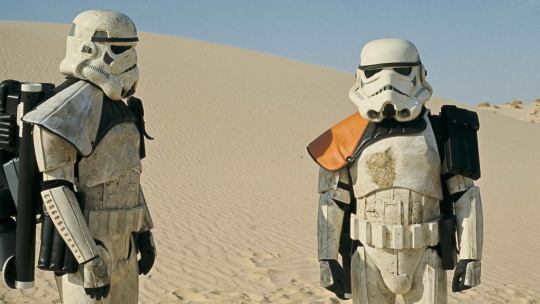

... and yet keeping it all consistent, in a way, you manage to make the film feel grounded and immersive, no matter how alien it is.
"[It] may sound odd in a movie like this, but credibility and realism, even in the most unrealistic situation… to sorta create that sense of realism is very important to making the story work and making you feel like you’re actually in the environment that transports you and gives you the suspension of disbelief that you need in order to enjoy a movie. [...] Kurosawa used to call it “immaculate realism” which is to make it slightly off-kilter, slightly eccentric, like things are in real life. Even if it’s a very predictable situation, give it that little funny edge that takes it away from that and makes it realistic. And I had to struggle very hard, in the Star Wars films, to make them appear to be realistic, even though they’re totally fantasy." - The Phantom Menace, Commentary Track #2, 1999

POST-PRODUCTION & VFX
Another one of the more impressive aspects of the first Star Wars was the dogfights and the trench raid of the Death Star. The camera pans with the spaceship, the dynamism of the cuts. The space battles is what made George creat ILM in the first place.
He was determined to do the opposite of what 2001: A Space Odyssey had done with that opening scene where the space ship moves into frame slooooowly...

... so he gave the team a collection of WWII dogfight footage to give them ideas.

(note: this was the same approach he would take years later with Dave Filoni, when teaching the latter how to edit and craft dogfights in The Clone Wars)
The attempt to film the trench run eventually led to the creation of the first motion control camera dolly.

Best analogy I can think of, when describing George's approach to Star Wars, is the following:
An avant-garde esoteric contemporary artist - y'know, the type who puts a blue dot on a white canvas and calls it art - creates a comic.
Why? Because he wants to make this one art installment for a gallery exhibition. After that, he intends to move on to other things.
But the comic is really good! And like, its audience quickly expands beyond just gallery visitors, no, everyone likes it.
Suddenly, the comic develops a cult following, and the entirety of comic book geek culture has zeroed-in on the artist and they're all asking him to make more art! And he makes more! And more!
Then he stops for two decades, moves on to other art projects, raises his kids. Years later, he discovers new ways of drawing, and he's like "I'm making a Prequel to the comic, y'all wanna see it?"
Everyone cries out gleefully: "Oh God, yes! Finally! Show us!"
But this motherfucker makes a manga.
Why? Because he feels like it.
And of course he does, he's just creating art, right? He discovered the graphic tablet, so he's having fun with it, because he's always innovating and pushing the envelope with his art.
And the movies are fine, by manga standards. But by comic book standards, they obviously suck! The comic book audience is mad. They wanted another comic book, not a manga. Why is it in black and white? Why is read right-to-left? This comic sucks!
(And arguably, they have a point... as a savvy businessman, he's made a whole lot of money off this comic, he built a media empire out of it, and instead of giving them what they want, he made something else)
But again... this guy isn't a comic book illustrator, and has been very explicit about saying this.
He's an artist who - for a very specific project - drew a comic.

Many things can be true at once:
the fact that these creative decisions didn't always hit their mark for the average moviegoer, or fans of "Star Wars, the space fantasy movies and expanded universe" (usually the lore-loving geeks like myself)...
... and the fact that they were meticulously and carefully crafted in a way that fans of "Star Wars, the revolutionary film" (aka fans of cinema and filmmaking) can appreciate.
There's a spectrum of the fandom, and there is a spectrum in the way we can appreciate Star Wars. Which kinda reminds me of that scene in Chef (2014) where Carl goes on a rant explaining the intricacies of making his chocolate lava cake to a food critic.
It's not just undercooked chocolate.
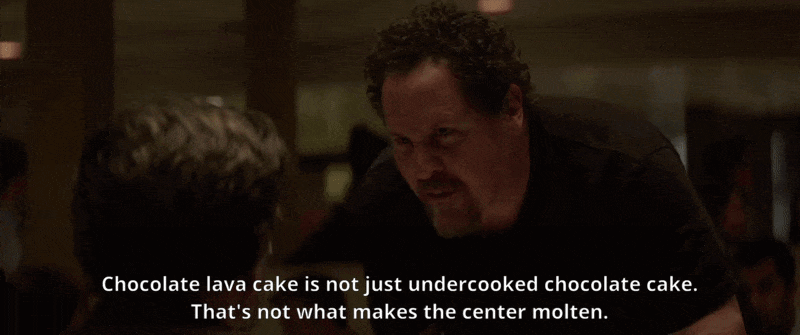
It's molten.
Conversely, it's not just flat, campy dialogue. It's an homage to the 1930s matinee serials à la Flash Gordon.
It's not just boring cinematography. It's a reproduction of cinéma vérité documentary-style camera work which effectively grounds the film.
Having considered all this, when I hear that Tony Gilroy or Kathleen Kennedy were more in the latter camp, I go "fair enough".
First of all, because like it or not, so was George. He clearly didn't give a single crap about the comics and books, besides signing off on minor plot points. He's not a "sci-fi movie director", he's an experimental filmmaker who makes movies set in space.
But secondly, because - aside from children - it's clear the audience he was targeting was these cinema-savvy folks who'd get his references and would be inspired by the filmmaking techniques.
Not the fans or the critics.
249 notes
·
View notes
Text

Dimitriverse here. And I'll use it as pretext to talk about Hopes. 'In this essay I will ☝️...'/j I must be one of the few - if not, the only one- (who's not on board with the anti-church propaganda |Just in case: I grew up in an atheist house| and not a Byleth hater either) who actually liked hopes because it supports and enhances houses narrative view (contrary to the common belief that it's the opposite).
Hopes shows a constant comparison between both games. And we know that this universe plays a lot with the parallels between different characters, and relationships. Both similarities and contrasts. Hopes is a contrast, seen from Shez's perspective.
It is established from the beginning that they only see the superficial positive qualities of the leaders, just like general tone presented of this game.
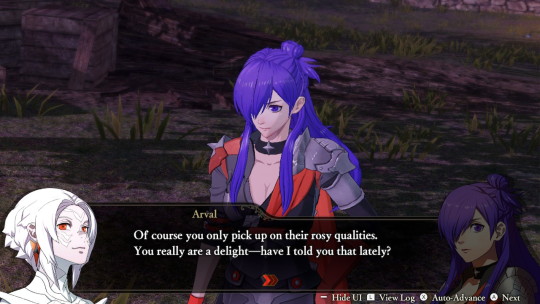
Here I'm going to focus mostly on AM's goal and its contrast in AG.
In AM Dimitri achieves redemption and benevolence through forgiveness and acceptance. These lessons he learns from Byleth - the teacher/ the guide/ the enlightened one (the class enlightened one is mea to alude that who have more knowledge and greater understanding of something, who also aludes to the original aspect of the game. Nirvana. The JP Byleth class) in an indirect way. Byleth in turn gets it from the goddess herself but also their life lessons/experience from GM, and the people surrounding them. WC is an important and crucial stage in Byleth's development, as is the interaction they have with the diverse students they tutor.
The role of Byleth goes beyond a mundane "self-insertion" of the player. Byleth is meant to be a bridge between that goddess and humans: the path to Nirvana.
Both forgiveness and acceptance are mentioned in the game but can go unnoticed due to the level of subtlety they are mentioned, but they are core elements in Buddhism such as compassion and wisdom that serve as a path to inner peace and freedom (specially for the leaders who rule over big factions of people), and breaks the chain/cycle of suffering, anger, revenge, resentment, among others.
And that reminds me of Arval's constant words: "the cycle of this world". What does Arval mean? The cycle of this world… said by an Agarthan "deity", whose only role in the game has been to generate constant conflicts between the inhabitants of Fodlan and beyond perhaps? so that they kill each other. I don't know Joe, something here smells weird -wink wink- (Not to mention it also emphasizes the qualities achieved through Nirvana)
It's Important to understand the importance of Forgiveness and everything involved in the act. Understanding forgiveness, as a spiritual practice, goes beyond simply letting go of resentment. It involves cultivating mindfulness and compassion towards oneself and others. Since the game has heavily references and basis from Buddhism you can grasp it from there (more than Christianity, I'm sure different faits have somewhat different or similar approach to some concepts). But need to mention the act is also applied from a physiological and neurological perspective (in case you're not much of a "fait" person like me. I still like the Buddhism take tho, from a philosophical standpoint💖).
Anyway, Dimitri AM manages to learn those lessons and is not just "to learn to live for himself", which is also important, but it is only possible to achieve it through the through the acts already mentioned: forgiveness, acceptance, compassion, etc. Acts that acts that are practiced externally towards others but which are mostly an act towards oneself. Compared to Dimitri AG where the path chosen is revenge.
Misfortune always dogs the steps of one who gives way to the desire for revenge.
Does he get the answers he thinks he wanted? Yes Did it satisfy him? A Dimitri fan knows it didn't. Can Dimitri's friends help him? No, because they're in a similar situation or under similar believes, and this game displayed it.
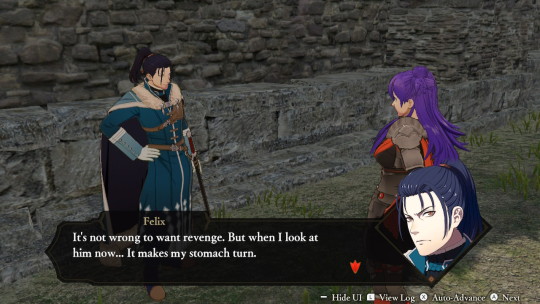
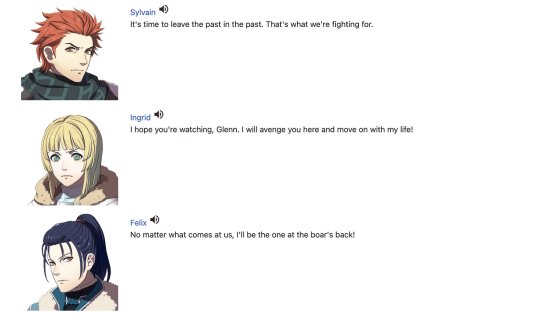
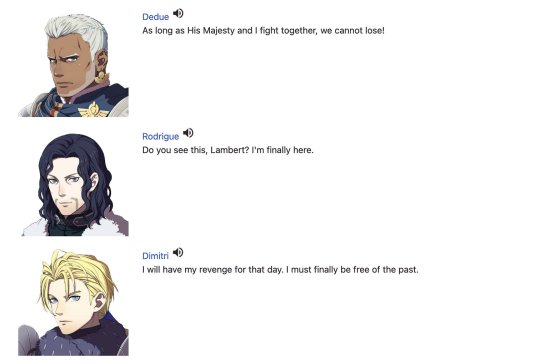
Sopilers: No, they won't get anything from getting revenge and certainly doesn't help to move on. Much less Dimitri, who's mental health has only been addressed at the end of a couple of supports. Is Shez a bad person? No! but they help no one and just goes along with whatever the leader says. Is Arval/Epimenides a bad entity? This is where I think, the original concept of the game is applied, the one mentioning. There's no good or bad, only a matter of perspective. But of course, that's something arguable and extense that deserves its own analysis.
At the end of all 3 routes, the war continues (despite having finished off Thales in AG) because the cycle continues. The cycle of anger, of suffering, of revenge, of prejudice, etc. And in my opinion, I think that's beautiful (the comparison, I mean). Thanks for coming to my Ted talk
#Long post#fodlan ramblings and analysis#thoughts on games#fire emblem 3 houses#fire emblem warriors 3 hopes#dimitri alexandre blaiddyd#fe3h#few3h#holy kingdom of faerghus#On the other hand#I think my Dimitri paint needs some fixing >__>#artists on tumblr#Disclaimer: i am not an expert in Buddhism principles so take what I said with a grain of salt
70 notes
·
View notes
Text
Seeing fan discussions about Blue Eye Samurai and especially Mizu's identity is so annoying sometimes. So let me just talk about it real quick.
First off, I have to emphasise that different interpretations of the text are always important when discussing fiction. That's how the whole branch of literary studies came to be, and what literary criticism and analysis is all about: people would each have their own interpretation of what the text is saying, each person applying a different lens or theory through which to approach the text (ie. queer theory, feminist theory, reader response theory, postcolonial theory, etc) when analysing it. And while yes, you can just take everything the authors say as gospel, strictly doing so would leave little room for further analysis and subjective interpretation, and both of these are absolutely necessary when having any meaningful discussion about a piece of media.
With that being said, when discussing Blue Eye Samurai, and Mizu's character in particular, I always see people only ever interpret her through a queer lens. Because when discussing themes of identity, yes, a queer reading can definitely apply, and in Mizu's story, queer themes are definitely present. Mizu has to hide her body and do her best to pass in a cisheteronormative society; she presents as a man 99% of the time and is shown to be more comfortable in men's spaces (sword-fighting) than in female spaces (homemaking). Thus, there's nothing wrong with a queer reading at all. Hell, some queer theorists interpret Jo March from Little Women as transmasc and that's totally valid, because like all analyses, they are subjective and argumentative; you have the choice to agree with an interpretation or you can oppose it and form your own.
To that end, I know many are equally adamant that Mizu is strictly a woman, and that's also also a completely valid reading of the text, and aligns with the canon "Word of God", as the creators' intention was to make her a woman. And certainly, feminist themes in the show are undeniably present and greatly colour the narrative, and Episode 4 & 5 are the clearest demonstrations of this: Mizu's protectiveness of Madame Kaji and her girls, Mizu's trauma after killing Kinuyo, her line to Akemi about how little options women have in life, and the way her husband had scorned her for being more capable than him in battle.
I myself personally fall into the camp of Mizu leaning towards womanhood, so i tend to prefer to use she/her pronouns for her, though I don't think she's strictly a cis woman, so I do still interpret her under the non-binary umbrella. But that's besides my point.
My gripe here, and the thing that spurred me to write this post, is that rarely does this fandom even touch upon the more predominant themes of colonialism and postcolonial identities within the story. So it definitely irks me when people say that the show presenting Mizu being cishet is "boring." While it's completely fine to have your opinion and to want queer rep, a statement like that just feels dismissive of the rest of the representation that the show has to offer. And it's frustrating because I know why this is a prevalent sentiment; because fandom culture is usually very white, so of course a majority of the fandom places greater value on a queer narrative (that aligns only with Western ideas of queerness) over a postcolonial, non-Western narrative.
And that relates to how, I feel, people tend to forget, or perhaps just downplay, that the crux of Mizu's internal conflict and her struggle to survive is due to her being mixed-race.
Because while she can blend in rather seamlessly into male society by binding and dressing in men's clothing and lowering her voice and being the best goddamn swordsman there is, she cannot hide her blue eyes. Even with her glasses, you can still see the colour of her eyes from her side profile, and her glasses are constantly thrown off her face in battle. Her blue eyes are the central point to her marginalisation and Otherness within a hegemonic society. It's why everyone calls her ugly or a monster or a demon or deformed; just because she looks different. She is both white and Japanese but accepted in neither societies. Her deepest hatred of herself stems primarily from this hybridised and alienated identity. It's the whole reason why she's so intent on revenge and started learning the way of the sword in the first place; not to fit in better as a man, but to kill the white men who made her this way. These things are intrinsic to her character and to her arc.
Thus, to refuse to engage with these themes and dismiss the importance of how the representation of her racial Otherness speaks to themes of colonialism and racial oppression just feels tone-deaf to the show's message. Because even if Mizu is a cishet woman in canon, that doesn't make her story any less important, because while you as a white queer person living in the West may feel unrepresented, it is still giving a voice to the stories of people of colour, mixed-race folks, and the myriad of marginalised racial/ethnic/cultural groups in non-Western societies.
#blue eye samurai#mizu blue eye samurai#fandom critical#blue eye samurai meta#wank.mp3#shut up haydar#fandom.rtf#this is a bit of rant but the prevalent whiteness of fandom in general just gets on my nerves i'm sorry#giving me flashbacks to a:tla fandom fr cuz it's the same shit! people love to devalue the stories of non-white non-western identities#also to be clear i am a southeast asian living in southeast asia and similar to mizu i am often alienated for having mixed ethnic ancestry#and even for speaking english (bcs my granddad served the fuckin. british colonials. so my fam speaks mostly in english)#cuz where im from it's still extremely hegemonic racist patriarchal misogynistic homophobic like the setting in the show#so like even though the story is set in historical japan and may seem far-removed from the experiences of a US or european audience#those of us outside the west and in the global south still face a lot of the struggles that mizu goes through till this very day#so please dont just dismiss that. it feels incredibly tone-deaf#okay rant over
64 notes
·
View notes
Note
Ya know I think I finally keyed in on something that often nettles me with some stories where Chloe either confronts Ladybug but gets checked, gets chewed out by Ladybug for her behavior in general or finds out she's Marinette go.
IE, either Chloe is upset about how LB handles/handled her in one way or another and gets a talking to. Or she finds out the truth and is overwhelmed by gratitude.
The thing is though, while I can maybe see the characters having these kinds of feelings, it feels a bit off when the narrative seems to go along with it too much.
Mostly because it feels kind of like it draws too strong a parallels between "Is kind of a dick" and "deserves to be in danger & to be largely disregarded."
Like, it took until Season 2 for Marinette to have enough of a heroic game face to even say "No not even Chloe deserves to be fed to the zombie hordes."
As said, I get why the characters might be upsets, she does hurtful or frustrating things. Sometimes she can be detrimental to the plot, though other times she can be quite helpful too. But like, at the end of the day, if the narrative, yes in the show but also in fics, feels like it backs that frustration up it feels skewed to me.
Low key in this regard Derision would almost be helpful, but meh.
Like, say Chloe finds out Marinette's identity post S3 and goes to angrily confront her about the whole "A supervillain was targeting me. You knew this & not only used me anyway but took away my one means of self defense, ETC" thing.
A counter along the lines of "Well you can be kind of an asshole and I don't like you" makes Marinette feel super petty given the scale Chloe's problems are operating on compared to the local jerk being rude to you.
I'm not aiming to minimize Marinette or other characters legitimately hurt feelings. Especially because they are fourteen ETC as well, so expecting them to be perfect is unfair. As said this is more of a narrative issue I guess. It feels like authors lack self awareness if they feel the conflict between real danger and being jerk are the same.
Does this make sense? How would you square such a confrontation if you were writing it?
I mean *waves at Chasing a Dream* I kind of did that, didn't I? The confrontation I mean.
What lots of people forget is that Marinette is not *just* a 14 yr old girl. She's both a hero and a protagonist. The themes of ML should have her trying to achieve good outcomes for everyone. The show *literally* has a reset power to be sure that there is no collateral.
It is *possible* to let Marinette be petty in the moment, to let her get a catharsis, but if she doesn't feel bad about it later and try to fix things then you aren't writing Marinette, you are writing revenge fantasy. -Which if you want to write that, go shead it's your story. It's just best to call a pot a pot.-
How the confrontation would go down would depend on so many things. You would need to give me a setup for me to answer 'How would you write it' 😁
Heck I even have it somewhat hallen in my current fic, Barren Soil, (no ID reveal) but since neither are PoV characters it isn't as spelled out.
21 notes
·
View notes
Note
hellooooooo smart person!!! i have two asoiaf questions to ask you. so i was reading adwd, the chapter with ellaria sand making her big speech (can i take the skull to bed with me, to give me comfort in the night?) which was literally one of the best monologues ever. but i think it frames justice in a bitter, bloodthirsty manner. the martells are completely understandably pissed off by the lannisters, is george saying in this instance, even though vengeance is good (emotionally), it’ll screw everyone over? and does this apply to the starks/boltons too? we have so many good speeches on war and justice: broken man, this one, bathe in bolton blood, the mummer’s farce is almost over, etc. but they do conflict. is that the point? justice is better not pursued? or needs to be thought out?
ALSO. your vibe is that you’re a theon enjoyer. so i was wondering where his story is. it’s about identity, yes? but who is he? he’s not a greyjoy, i don’t think, he seems so disconnected from that violent culture, but he’s no stark. i think he wants a family, but the north will never accept him as a stark. so what’s theon’s purpose? i’m so sorry for talking so much but i always love your answers
ok ok ok. anon ily. i might answer the theon one in a separate post if i have time; im gonna try to be as brief as possible but i am gonna put this under a readmore because you touched on uhhh probably the central question of the whole series lol! in fact you could probably write a phd thesis about violence and justice in asoiaf lol, but lets see if i can boil it down quickly maybe not clickbait???? (i lied, this got egregiously long)
ok ok ok some disclaimers up front. I personally am probably a bigger pacifist than most people lol, so this may colour my take somewhat. secondly spoilers but my answer is that i dont think the series actually has a solid answer to the question of retribution/vengeance. my favourite kinds of art are pieces that ask questions that can't be answered. and: is violence ever acceptable? can it be used as a means to a good/just end? <- is like, a hugely unsettled matter in the entire human experience. this is a question we all ask ourselves at some point. it's even more complicated and tangled in real life! is the death penalty ever okay? how can we wage just wars? how do we protest subversively? can people be rehabilitated? even: can we change? that's what politics are all about! the q of violence is something i am constantly thinking about and am still unsure of my answers! most people are!
what asoiaf does so well is pick at the idea of violence in about a hundred different ways and though a hundred different lenses. not all violences are equal! of course not! it is very clear about this, as well as that said violence is not always physical, is most often institutional. and justice.... well justice is completely incoherent in this world!!! the first chapter opens with the protagonist executing a man we as readers KNOW did nothing morally wrong! the thing with asoiaf is that there is always an added nuance to challenge you when you think you've made up your mind. someone shows a glimmer of humanity, or else descends into unexpected cruelty, or else complicates the narrative. there is always a 'but'.
for example: take robb's war for ned. he is trying to avenge his father, save his sister. okay, that's noble. that's just. you want to root for that. BUT: their warpath endangers hundreds of thousands of smallfolk, not to mention the thousands of innocents in their armies forced to fight one another and die for the sake of one man. how could that be worth it? BUT: tywin's army was desolating the riverlands anyway, so wouldnt it be a net good to defeat them? BUT: protecting smallfolk was never their priority; their 'justice' is only for the highborn; politically, an independent north would probably not be any better or worse for the peasantry. a tree of hanging women who lay with lions. "the north remembers", when it's first used on page, is not a joyous rally; it's robb reflecting bitterly that harrion karstark cannot openly forgive him for killing rickard, or risk losing face. rickard, who was killed for killing lannisters, because the lannisters killed his sons-- because robb waged war, because the lannisters killed ned! a poisoned cycle that can't end, an ideology defined by war, remembrance and loyalty as its own sort of sickness.
the thing about violence as justice in asoiaf is that it is never portrayed as revelatory. it's not... like... cool lol. did tywin deserve to die? idk, maybe. but this does not lift a weight off tyrion's shoulders. it doesn't feel like he won. this is something all characters must bear and grapple with. arya in particular is rich with this and that could be its own essay ofc. at its simplest, though, we have sandor. he killed her friend. a child. do child-murderers deserve to die? a lot of people in the world would say yes. but when he is at her mercy, when he is literally begging for her to kill him, she can't. it's too much. when dany orders the disembowlment of the slavers, she questions the choice internally. does torture have utility, here? what is it worth? ("But later, when she passed the men dying on the posts, when she heard their moans and smelled their bowels and blood... Dany put the glass aside, frowning. It was just. It was. I did it for the children.") again, i dont think the narrative has a straight or easy answer, which is why she's asking at all! if these answers were easy there wouldnt be a book. or things like jon's babyswap, which i consider its own kind of violence— but it is born from an unflinching desire to avoid worse violence. so... can it be just, then? theon murders the miller's boys. little kids. does he deserve to be punished? yeah, right? but then we are confronted with reek, and the empathy in the reader flinches, says: nooooo not like that!!!! and then feels bad for ever thinking it! so if he can change, did he ever deserve to die? when joffrey dies-- joffrey!!!-- there is very little catharsis to be found. ("He has Jaime's eyes. Only he had never seen Jaime look so scared. The boy's only thirteen.") the prose focuses on his purple face, his futile desperation to breathe. the way he looks like a child, because he is.
and then there are all the logistical, logical ends that need to be dealt with when seeking retribution. you got back at someone: great. now their family or allies or loved ones will get back at you, and on and on it will go forever until no one remembers the original injustice (see: the brackens and the blackwoods). now there is a power vacuum, or a counterrevolution, now the crops have burned and everyone is starving, now there are orphans. so... was it worth it? this is generally never the intent, but none of this can be sidestepped, either. a large point: no matter how justified in war you may feel, these consequences must still be borne. whether they are worth it in the end is your decision to make.
so we come to ellaria, with no clearer answer than what we started with. and i agree, it's one of my favourite quotes too. the endless question of: what do we do with what has been done to us? the violence has already been done, there is no way to bring someone back, there is no retribution. the victims are dead and so is their killer. and yet it is a hollow justice, because nothing has changed. women like elia are still bartered as political pawns and discarded. again, there is no coherent justice in westeros. it is only by chance that gregor died anyway. the systems of power are still functioning, and the aberration of that is felt. the sand snakes are grieving, but they are grieving the only way they know how. oberyn walked past obara's weeping mother when she picked up a spear. the only language in westeros is violence, the only power in blood. well, it's better than being powerless, right? .....right?
there is no good option. doran picks a side, having agonized over it for decades. this was not easy for him! the martells are understandably pissed off by the lannisters— of course— but... who is left to seek justice from? tywin is dead. robert is dead. aerys and rhaegar are dead. gregor is dead. amory lorch is dead. they could war against/kill cersei... i guess. jaime, maybe? myrcella? tommen? great, what would be the point? will their deaths feel good, emotionally, to the martells? or will they just feel hollow, like so many scenes of retribution in the series?
so i might favour ellaria's vision-- peace and submission, anything just to survive, to avoid hurting people. but this has its own very very obvious problems! pacifism is not a get out of jail free card lmao! "war will come, whether we wish it or not," obara says. it's highly possible this move would be seen as a sign of "weakness", and would only invite worse violences from the ruling power. again— the misery of this world is systemic, not individual. that's what feudalism is. that's what power is. it requires violence to maintain. but violence is also almost always required to challenge or protest it. so, ok. fuck. fuck! how can a world like this be borne? and how can we change it?
god i wish i knew!!!!!! — george rr. martin, 2011
#asoiaf#this is nowhere even close to my full thoughts on this. at all. but a little taste a little glimmer#'a little glimmer' i say about a 1500 word post#i spent so long on this im not gonna be able to get enough sleep oops. Oh well
226 notes
·
View notes
Note
18
choose violence ask game
18. it's absolutely criminal that the fandom has been sleeping on...
oh boy. where do i even start. i feel in general a lot of the time the fandom focus is always like. just to the left of where it should be. so even in places where my opinions broadly align with it (eg, warren leight bad writer), it's usually not quite for the same reason (eg he's mean to me on twitter/he makes olivia suffer vs. my thinking he routinely wrote some of the most misogynistic takes on olivia possible and is the person responsible for the most ideologically poisonous episode of svu perhaps made in its entire run, confess your sins to be free). go big or go home here, so let's go with my most cancellable opinion about this: that in general the fandom has willfully blinded themselves to how much better svu is in the last couple years under graz's tenure due to their feelings on him as a person. i'm going to avoid the quagmire of litigating whether you can separate an artist from the art (which, you can't actually!), so let's just focus on the the text itself. 24 was uneven, sure, and 25 clearly was a product of its production circumstances, sure, and yes, cognitive dissonance is a hell of a drug, but like. objectively we are getting an svu that is better than much of 2.0 by leaps and bounds, not just the usual bad/good episode standard deviation per season. i'm over the moon about olivia's emdr therapy, and we got two genuine standout, possible all-timer episodes for her just in 25 alone. svu is now thematically more complex, its conceptions of character and the relationships between them are more nuanced and compelling (and not just with olivia, either, but also fin and carisi, sykes and olivia, muncy and churlish, duarte, and amanda). even the cases themselves are often better, with more realized dramas and character conflicts of their own (last season's bubble wrap, 25's marauder). we finally have back the narrative cohesion of the a-stories indirectly commenting on or relating to the lead character's emotional b-story (dead ball, duty to report, all of amanda's arc in 24) too, which in turn contributes to a more cohesive season with a main throughline, or a developed theme (25's question marks and lost girls) even if it is not the main focus of the individual episodes. now-- this naturally does not change the fact svu is still svu (derogatory), and that we are still subjected to true clunkers of season quota episodes (s25s truth embargo) or the general misbegotten unfavorites (king of the moon, combat fatigue, etc.), not to mention the executive meddling and likely corporate machinations that have to be going on behind the scenes we don't know about (the blood out kitchen scene cannot be the first or only time something like that has happened, it's just the most visible, or the one show people seem to be the most willing to break ranks on to talk about). the irony of this is that the reflexive IT SUCKS or IT'S THE WORST IT'S EVER BEEN complaining, or the frankly, silly, OLIVIA IS TOO MEAN NOW or WHY CANT SHE BE HAPPY's actually obscure what is genuinely good and bad about what graz is doing. and the kicker is that i do think there are things in his writing to critique!!! i think he loves his mouthpiece male characters too much, i think he is hamstrung by having to burn a lot of narrative real estate on introducing new characters every season that then limits how much he can follow up the rest of the season (muncy fades from center stage in s24, curry is given grace notes in late-25, but it's aimé donna kelly's acting that saves curry having an arc). i think his writing, especially in 24, had a tendency to be much too sentimental, if not outright self-indulgent, and while he's either learned to dial it back or now has someone on staff to check his excesses, some of the self-indulgence still bleeds through in bruno's dialogue in a way i find sometimes endearing, but oftentimes annoying. anyway. yeah. they're sleeping on the fact that like. svu is kind of good now.
6 notes
·
View notes
Text
Analysis of the Soul Fisting Scene Part 3
Please read parts 1 and 2 first.
Soulless Sam's submission to Dean's authority in the soul fisting scene and season is fascinating to me because it's so different to how Sam is. On one hand, you could argue that his submission is due to him feeling that something is wrong and trying to regain the sense of normalcy he had before.
Soulless does talk about how he knows something is wrong and it worries him. Perhaps he's just saying that for Dean's benefit. It's possible that he's only letting Dean have control because it reminds him of his past, but he was also following Samuel Campbell around and he didn't have a past relationship with him.
Regular Sam rebels. He rebels against John, against Dean, and he demands an egalitarian relationship from s1 through s15. A lot of the Sam and Dean conflicts arise from Dean trying to control Sam or making decisions on Sam's behalf.
Although Sam has more power and force (and isn't afraid to use it) when Soulless, he doesn't push back on Dean until he worries that Dean's attempt to resoul him will kill or damage him.
In the belt scene, he's not worried about Dean or Castiel actually harming or killing him here. Although he has no emotional attachment to them, he regards them as allies and feels safe enough to allow himself to be tied up and tortured by them. Castiel is acting shady and still Sam trusts him, probably because Dean does.
It's also fascinating to me how Dean directs Castiel's actions in invading Sam's body. Throughout season 6 and the series in general, there is the question of Sam's bodily autonomy.
Sam's body is frequently used as a tool by others in the series: Meg, Azazel, Lucifer, Castiel, Dean, Crowley, etc. In season 9 this issue explodes, but it's a heavy theme in season 6.
In the very next episode, Crowley wants Sam and Dean under his control, so he threatens Sam
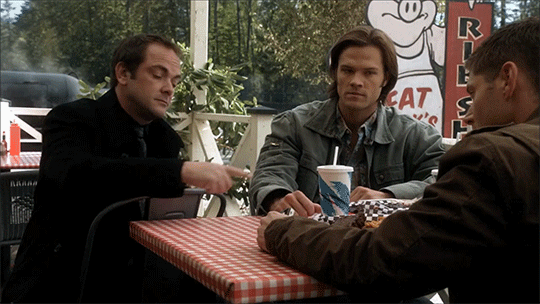
Crowley says,
You need to stop thinking of this as some kind of deal. This is a hostage situation, you arrogant little thug. I own your brother! Do you understand me?
Bolding mine. Sam's body is regarded as Dean's property. The decision to resoul Sam is placed in Dean's hands. After Sam regains his soul, Dean tries to control Sam's access to his memories.
Likewise, when Castiel wants to control Sam and Dean and get them to stand down, he harms Sam.
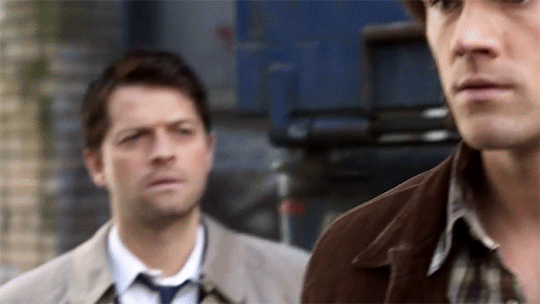
Both Crowley and Castiel harm Sam's body in order to control and manipulate Dean. Both heaven and hell regard Sam's body as Dean's property. Even Death puts Sam's soul back in his body for Dean, not Sam.
Like Sam, Castiel also becomes an extension of Dean's body. This isn't the first or the last time that he engages in torture on the direction of Dean.

It's interesting because, as an angel, Castiel is commanded to carry out God's will, which he did before he met Dean. In a way, he replaced God with Dean, so he now carries out Dean's will... for the most part. Occasionally, he will rebel, which causes conflicts between them (see s14).
In s6, Castiel is hiding information and acting in secret, but everything he's doing is in service to Dean (and Sam). He's trying to keep them out of another apocalypse. Even when he's opposed to Dean, he's still in service to Dean.
Dean is threatened by Soulless and is acting out of fear. In s6, Dean becomes a lot more vulnerable than he's been since s1 and it's due to the threat by Soulless. For example, the scene where he's turned by the vampire has him as a victim of both the vampire and Soulless, who allows him to be turned.


If you like hurt!Dean, s6 is full of prime content. Yes, it is mostly other people victimizing him not directly Soulless, but they are doing so in order for the narrative to show how vulnerable Dean is with Soulless Sam. Although Dean is directing Castiel in the Soul Fisting, he's also standing behind him, keeping a safe distance from Soulless.
In the next episode, 6.08, Dean wakes up from sleep very vulnerable

Soulless has caught him off guard
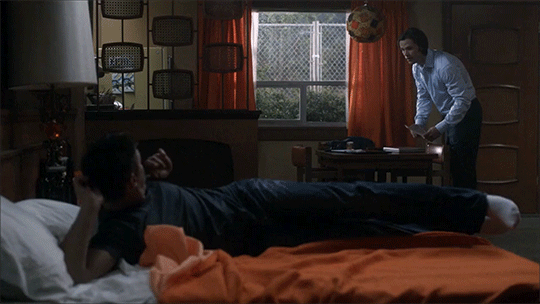
What's interesting is that Soulless sleeps (or doesn't sleep) near the door, when normally Dean is closer to the door.

While Sam is Soulless, Dean is off kilter and wants Sam back and he's willing to play games with Death in order to get his brother back. He'd do anything for Sam, so why is he so rough with Sam's body? Yes, Soulless is in the body of his brother, but the same time, Soulless is a monster and Dean hunts monsters.
As mentioned before, once Dean knows what's wrong with Sam, he wants Soulless to be locked up. He doesn't want to risk Soulless hurting him or anyone else again.
Soulless refuses to be locked up (his submission to Dean only goes so far) and Dean is forced to keep Soulless with him, in part because Soulless' refusal to be locked up is one of the most Sam aspects about him.
As the person who requested this meta has not seen past the beginning of 8, I'm going to stop for now and then I'll write more if/when they watch 9 because a conversation about Soul Fisting is incomplete without knowing what happens in 9.
(Also there's no way they didn't know what they were doing when they filmed and named this)
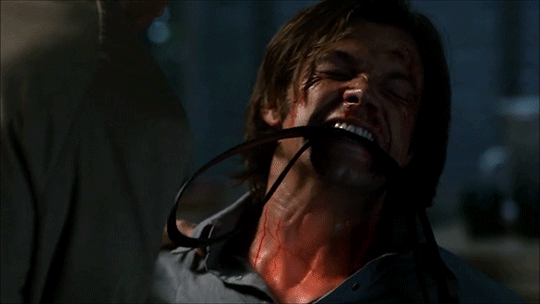
#supernatural#spn#spnfamily#sam winchester#spn family#jensen ackles#dean winchester#jared padalecki#castiel#misha collins#tfw#team free will#spn s6#spn meta#meta#sam&castiel
35 notes
·
View notes
Note
hi can I ask for more about your Ava thoughts?
hello yes hi i'd love to talk about more of my Ava thoughts while i'm still all up in my Ava feels.
Ava is such an odd character for me because she's as fascinating as she is frustrating. not a comfort character not the character i project not even the character i want to study like a bug not a blorbo not an anti-blorbo.
rather she's ... i don't know what Ava is too me. i have spent years processing her and thinking about her and i'm still not done doing it.
i have both sympathy and empathy for her (i too have been in bad relationships and escaped them) but i also refuse to let the self-recognition i see blind me to her faults and failings.
my feelings for Ava are about as wishy-washy as she is herself and are constantly in motion and shifting depending on which season or episode i've rewatched recently, simply because Ava is a top-tier portrayal of the Imperfect Victim and during the show even starts using what power she cobbled together to hurt others. she's complex and even indiscernible in some regards. she's both strong and admirable yet she's also pathetic and deplorable.
the circles of history etc etc.
i don't even particularly like Ava yet i also respect her character immensely and she's one of my favorite fictional women based not on vibes or her archetypes but rather her role in the narrative and the way she was written. Justified wouldn't be Justified without her presence. it even pisses me off that Ava wasn't introduced as a main character in her own right considering how the show ends with the narrative being shared between her, Raylan, and Boyd's viewpoints. but i digress!!
Ava is ... complicated for me. i love her sometimes and i hate her other times and that makes her a very Human character. i can't quite pin one feeling or take on her character, she's too big for a single label to fit on her.
i both cheer for her and boo for her. she bamboozled me during my first watch of the show and i also bought into the #outlawqueen #girlboss bullshit fantasy she was trying to live yet Ava is way more interesting outside of those empowerment fantasies. Ava stands up for herself and becomes her own hero in the end, sure, but upon rewatches of the show it becomes damn heartbreaking to see her actually depower herself with the way she sticks herself to a man. she's desperate she flails around she makes such poor ass choices it's mind boggling.
yet that's what makes her so great too.
i wanted her to escape Harlan alive (because she deserves it because no one deserves to die) because the good person in me wants her to survive to be free. and yet sometimes i almost wanted her back in prison (because she allied with Boyd and profited off the suffering of others same as he did, she sold out her home and stood on the backs of her people and parroted Boyd's hypocrisy) because the bad person in me wants her punished the wrongs she committed, even if i know two wrongs don't make right even if i understand the whole prison system is bullshit.
because Ava is such a Human character she brings out those conflicting an contradictory human responses in me.
but overall i'm happy her story ended the way it did and i'm glad Ava exists as a character, we needed more fictional women like her. Ava getting her fresh start out in California with her son while also having to hide for the rest of her life and NOT being able to live as herself was a very fitting end. it's so western-coded it's delicious.
anyways i don't know where i went with this but thanks for walking with me through it.
Ava Crowder née Randolph girl you are SO blonde and such a hot mess yet on a big brain meta-level i do adore you truly, i do 🖤
11 notes
·
View notes
Note
Gonna ask you 7, 10 and 15 for the relationship ask :3
HAYOOO! <3 THANK YOU FOR ASKIiiiing! Brrr xD (Hehe I am just always so giddy when it comes to sharing the love for the same NPC)
7. How Important is other people's investment (or enthusiasm) in your character's relationship? was there a consideration when you were planning it? Have you ever changed a character's relationship(s) due to other people's response to it?
I actually have had more bad than good experiences with the ship than I realise. (lately more leaning to good) Thinking back on it, I always make ships that make me happy. Which James x Ilberd does. It was the first time in my life I actually dedicated myself to shipping so hard with a lesser loved NPC. People would exploit it, make fun of it, or just simply hate on Ilberd to see me rage (cause I could easily fall for things like that) and then point at me saying; see I told you. So those actions made me realise that other people's enthusiasm for the ship/NPC doesn't matter as long as I enjoy it. Of course the positive outcomes about it, such as you now also seeing the fics and oh man- *Blush* Let's just say the POSITIVE side, now that's a treat! And I am very thankful that my 'sloppy' writing has been entertaining so far! <3
-
10. Is it important to include tension or outright areas of conflict in a relationship? If so, how do you explore these? Or does it not appeal to you?
Ilberd's literally seeping with lore that can add so much tension to a relationship. I never realised how much until I started daydreaming about it. James is the complete polar opposite of what Ilberd is and does in ARR - HW. But the love makes him blind to manipulation and other things.
But then Ilberd realises James as always been trying and has been legit and then realises he exploited him- just... Yes. xD (Maybe one day I will redo the entire storyline with a revisited mindset)
-
15. Did you build up to your OC being in their relationship? Or did you put them into it quite quickly and then filled the background in retrospect?
WELL- *Ahem* Now listen up here's a story about a lil' yellow guy- No but. James had been the "WoL" ever since the narrative of the game wished him to be. That was until the absolute end of Stormblood/Shadwbringers. I had already written some parts here and there on how it would work between a WoL/Ilberd and in the end I just shook my head and went; "WELL this isn't it."
So I made James into the position I have put him in. Just to see if the ship would work more like that, and it all sounded so much more involved. I wanted more angst, I wanted more 'screentime' with Ilberd. I needed more scenarios other than what the game had given us. And with a WoL, 50% of what I wrote between them, would not have happened or could not have happened. I know writing is what you make it to be, but I am a very picky person when it comes to filling in gaps on an actual story. Timelines etc... As an example, I could never seem to figure out how my James as WoL would not figure out or catch Ilberd planning the act of end post ARR, for example. I would never see James being THAT naïve. That and he would want to pursue Ilberd more than going to Ishgard in HW lmao. And stand with freeing Ala Mhigo rather than solving a 1000 year old war he barely knows stuff about xD Since Ala Mhigo is is homeland and all... ...
SO YEAH- before I ramble on- That's why James became the OC I know and love, and he's a happy (and stinky ;P) chocobo caretaker that has seen some shit and is now retired after Stormblood (Unless Square gives me more Ala Mhigo lore... Which I doubt kekw)

3 notes
·
View notes
Note
I love LOVE your rhaelya thoughts. rhaelya hunts the narrative and the characters, more in daenerys, arya and jon. but jon, oh, jon :(. bby boy thinks that his mother did not love him, but lyanna's last words and thoughs were for him "promise me ned, promise me" probably to protect him forever but couldn't, and that is why ned feels like he failed. and rhaegar, while he is most and foremost paralleled to dany, jon has number of things from him. the truth of the parentage is gonna be a conflict from him, but i truly believe that he will love having a mother that loved him and that his parents loved each other. jon has been dreaming of it for years.
Thank you nonnie!! 💖
Well yes Jon breaks my heart in that situation. And when he finds out who his parents, he will probably believe he is a child born out of rape because that's what all Northerners believe apart from Ned who is dead. It will take a while I think before he finds out who his father really was.
And yes, Rhaegar has been paralleled to Dany mainly that's one of the reasons people hate him so much but there are a lot of parallels with Jon too. That's an interesting question because I've always seen and loved Jon particularly because of how pure of a Stark he was. The brooding, ill-tempered, solemn and grim personality is very characteristic of the North, and of Ned. Jon is a great swordsman like Ned, he is honourable like Ned and he has the Northern looks, dark hair and grey eyes. In all sorts and purposes he's a true Stark. BUT, I can't help but feel that the comparison between Rob's and Jon's looks was kind of weird:
"Jon was of an age with Robb, but they did not look alike. Jon was slender where Robb was muscular, dark where Robb was fair, graceful and quick where his half brother was strong and fast."
So slender, dark, graceful and quick. Now the graceful part is weird. Northerners are not really that graceful, let's say that's not their trademark. Of course you can say Lyanna was probably graceful, but was she really? She was basically a tomboy like Arya, she was very pretty but I don't know if "graceful" would be the first word one would use to describe her. In Westeros, which House is particularly defined by gracefulness? Well, you guessed it. Especially Rhaegar was said to be very graceful and slender ("long fingers" etc etc the whole Targ software). So yeah we have that. Also personality wise, well, Jon has a trait that was very characteristic of Rhaegar specifically, the guy knows how to create a strong impression on people. Jon befriends Tyrion on the spot, he is very influential in the Knight's watch, he became Lord Commander at such a young age, women love him etc. Rhaegar was loved by smallfolk, Cersei was completely enamoured with him, Barristan remembers him fondly still, Jorah calls him the last dragon, he haunts Jaimie's dreams, he left a big impact on people. But then again, Lyanna did too, so I guess he got it from both his parents. Also the way Rhaegar was born in grief parallels Jon's very tragic birth and the shadow that was cast on him for his whole life for being a bastard. That's also very specific.
So the "promise me Ned" line confuses me a lot. For a long time I believed that Lyanna just asked Ned to burry her in Winterfell because the first time the phrase is mentioned in the book the context is clear.
"I was with her when she died," Ned reminded the king. "She wanted to come home, to rest beside Brandon and Father." He could hear her still at times. Promise me, she had cried, in a room that smelled of blood and roses. Promise me, Ned. The fever had taken her strength and her voice had been faint as a whisper, but when he gave her his word, the fear had gone out of his sister's eyes. Ned remembered the way she had smiled then, how tightly her fingers had clutched his as she gave up her hold on life, the rose petals spilling from her palm, dead and black".
The main problems with this is 1) why was Lyanna afraid for a simple wish as to be buried at her home and 2) why does that line keep haunting Ned throughout AGOT? He recalls that line so many times at seemingly irrelevant situations and it's weird because Lyanna apparently got her death wish. Why would GRRM insist so much on that particular line if it was something that was already settled forever? Sansa reminds him of that, he sees that in his nightmares, then Robert himself reminds him of that line when he says the exact same words before he dies. And what did Robert want Ned to promise? Well, that he will have a specific funeral feast for him, and that he will try to protect Daenerys' life. Lol.
We don't know what this line means, but it probably refers to Jon. We'll never know for sure because we ain't getting the books 😂
#asoiaf#got#I'm on my Rhaelya bullshit again#rhaegar x lyanna#Rhaelya#rhaegar targaryen#lyanna stark#jon snow#ned stark#aspa rambles
103 notes
·
View notes
Note
hi, I'm newly trying to get into revue starlight. I've finished the anime, but I'm not quite sure about the order in which I'm supposed to watch the stageplays? could you let me know ?
Yes!!! Absolutely!!! First of all welcome to the Stage Creation Department!!
My personal recommended order in which to watch the plays is:
#1
#2 Transition
The LIVE ONLINE
#3 Growth
The LIVE Seiran - BLUE GLITTER
The LIVE Edel - Delight
The STAGE Chuutoubu - Regalia
All plays have english subs by now, except Regalia since it's the most recent one. Feel free to DM me if you need any links to subs etc!
Some notes under the cut!
This order is almost identical with the chronological order in which they were performed, with the exception of Blue Glitter/Growth, where Growth was supposed to be performed before BG (which makes more sense narratively), but had to be post-poned for an entire year due to the pandemic. The Live Online was done online (duh) in order to bridge the long gap between #2 Transition and #3 Growth, so it kind of acts as a #2.5 but is not extremely plot-relevant and more just a bunch of fun!
Note also that the last three are "spin-offs" to the "main" storyline, and as such can also be watched kind of out of order as well since they only loosely reference each other/the main storyline. I would still recommend this order though, since #2 is where the Seiran kids are introduced, and then become the protagonists of Blue Glitter, so it helps if you're already familiar with the characters. For Edel Delight, bestie I regret to inform you that the Edels AKA the students of the Siegfield Institute of Music were introduced in the mobile game Revue Starlight Re:Live, same for the middleschoolers of Siegfeld that are the protagonists of Regalia. You can play the game and read those introductory stories to those characters, but honestly I cannot in good conscience recommend you play Re:Live (I mean, go and see for yourself, but I personally have become quite dissatisfied with the game). Instead, definitely check out Project Karthuria, which lets you read all those intro stories on your browser under the story reader > schools tab. The intro stories are fairly short and give you a good idea of the general conflicts that those new characters face. If you're not interested in the spin-offs, I recommend you at least watch Blue Glitter since you'll already know these characters. Edel Delight is very fun but it might not be very enjoyable if you don't already know the characters.
65 notes
·
View notes
Note
Ah. I think we had crossed wires. When I say secrecy I mean the story/narrative is playing keep away with outright saying "Yes Raven went and killed Spring in the Branwen camp/outside/full throated betrayal" while implying it in Volume 5. Raven certainly and probably did kill Spring... At least technically. The question is what value the "Mercy" was. That is the two narrative questions with Raven. Why did she leave originally and what happened to the original Spring because Raven claims mercy.
Summer question is that final mission, which probably ties into at least one of those questions but the only real foreshadowing was Raven's silence on Summer as a topic. There's a reason why Raven being involved was a surprise. An interesting character beat with Raven is how she's one of the extremely few adults to volunteer sensitive information. Especially in regards to Ozpin - with her giving information to Yang about the bird transformations that proves the point that Ozma hides information Raven is in conflict with Ozma. And that puts a decidedly interesting shade to things with the rest of her team being very much loyalists until Summer wasn't. If things are merely as simple as Raven killing Spring for power or for being weak... Well look at how Maiden's being hunted and trapped is a bad thing throughout the series. Raven is the Spring Maiden, she's part of that thematic line. The two points do not line up cleanly if that makes sense.
i mean.. i think they kind of go hand-in-hand? narrative secrecy is only effective as far as the characters have a reason to obscure / lie about / etc. the truth and it fits their character.
raven claims she trained spring without any visible results. so, which is more likely: raven allowing spring—who she considered weak—to partake in a dangerous mission, or that she (presumably) grew frustrated with her and killed her, convincing herself it to be mercy (see: raven's perception of the word "family" being skewed -qrow)?
and to that, i don't know the answer. in both cases, raven would / could feel guilt and / or regret: for bringing spring along on a mission she had no business on, or for reverting into her old self in a heat of a moment, her faults coming to surface.
why raven left in the first place, beyond learning the truth about salem, and why they've kept that reason close to their chest is to me the bigger mystery. if raven helped spring escape, then "it's very noble to want to help your sister" <- would raven not consider helping spring noble? if so, why wouldn't she tell yang the truth about that at least, since it makes her look better? would raven being the spring maiden before she left explain her reasoning, i.e. the burden became too much, finding out the truth, knowing she had the target on her back for the rest of her life and how she would risk her family's safety by staying? in that case, raven wouldn't tell the truth, not in the camp at least, since she had no idea if yang was going to stay or not, whether she would take that information—her being the spring maiden—back to qrow and oz. plus, admitting she was scared would probably be a big no-no for her.
i also wouldn't really say raven's involvement came as a surprise: "family. only coming around when they need something" back in V5 already hints at someone finding raven before yang did; it's not qrow (he says raven finds him, not the other way around), and it's definitely not tai, so that really only leaves summer; "you sound just like your mother" after ruby's speech about working together and having each other is another hint towards the friendship between raven and summer deteriorating rapidly (something something "your teammates have never let you down before"); and in the same moment as qrow leaves the door open for ozpin to have hidden more things from them while being out-of-the-loop about summer's mission, he leaves out raven from the list of people unaware what summer was doing—so if the spring maiden in any capacity was involved, does ozpin know about it? if the spring maiden was gretchen, who do we trust more: ozpin, the person who lies and omits information, who says gretchen died during a training mission but never how, or raven, who keeps secrets but volunteers information (even the type ozpin doesn't think she would) willingly, the only lies she has ever told related to the true identity of the spring maiden?
speaking of gretchen, what about "no more gretchens, boy"? how does that account to all of this? is it related to maidens and their treatment, in which case we also have other examples with pyrrha, penny, and even amber? or is it about the huntsmen academies? if ozpin found and got gretchen to attend beacon specifically bc she was the spring maiden; did he skirt few rules doing so? gretchen was "just a child", she "wasn't ready" -> ozpin invited ruby to attend beacon two years early. he looked the other way re: jaune's faked transcript and his very apparent lack of skill that even glynda notes. was gretchen younger than 17? was she wholly untrained to the point she would not have gotten into beacon under normal circumstances?
this is just a whole lot of questions but um. that's how i like to approach theories lmao. it's mess what it is, but it does leave me with this feeling that nothing is really clicking perfectly in place. there's always something that needs just a tiny bit more explanation, a missing piece of the puzzle we obviously don't have. and it's not made any easier by the fact the we know very little about summer, even know, raven has so many walls built up that she's basically an onion of secrets like good luck trying to figure that one out, and ozpin lies. a lot.
8 notes
·
View notes
Note
Do you feel comfortable with sharing some hard numbers re: what the ship ranking is like, what people's favorite chapters were etc? I love statistics
Yes sure! I can give you some but I wouldn’t take them all at face value. The answers probably don't reflect fandom at large. Theyne was the second most popular ship here with Theonsa being one of the least popular ones but that's probably simply because I have a few Theyne shippers following me and because I block anyone who tags show narratives as asoiaf for my own well-being.
Also, I need to explain, I had a total of 114 submissions. Nine of those came from irls who, like me, came to know the books without any show influence but, unlike me, haven't interacted with the fandom. Their answers were not taken into account for these numbers since they don't represent the fandom - they are not even part of it - but I might mention them in the future when comparing their perception of certain things to common fandom tropes.
The following is based on the 105 submissions I got from the fandom. I don't think a single question was answered by everyone.
Ship you like engaging with the most:

Personal observation: The rarer the ship was (ex. Theyne & Greysnow), the more extensive was the person's response when they got to talk about it in the next question. Probably because they usually don't get to be that enthusiastic about them.
Ship you like engaging with the least:
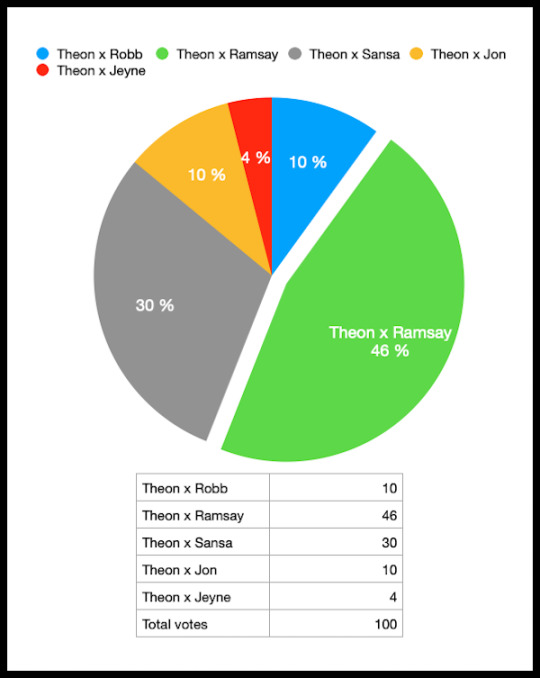
Personal Observation: Thramsay didn't surprise me, but Theonsa sure did. It was mostly chosen by Throbb and Theyne's and also by a small minor of book only people. There wasn't a lot of animosity for it in the way there was animosity for Thramsay though. Most of the throbb shippers who chose it just felt territorial about their Stark/Greyjoy ship and the Theynes were mad about so much stuff being taken from Jeyne.
When did you start liking Theon?
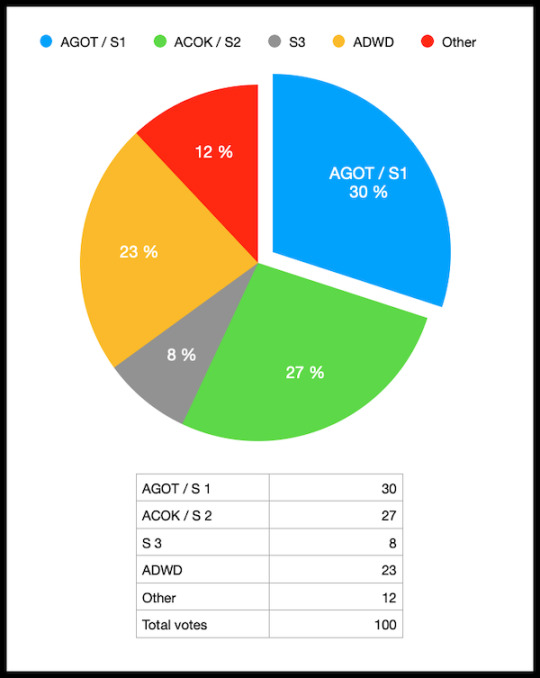
Personal Observation: Very surprised by this one. I haven't noticed any strong patterns in which fans chose which option either.
Could you pick your three favourite Theon POV ACOK chapters?
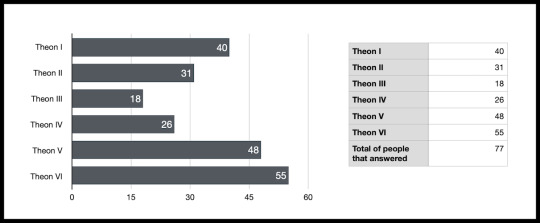
Could you pick your three favourite Theon POV ADWD chapters?

Personal Observation: Both of the former questions were very chaotic. Some chose four, some chose only two. One person chose them all and it was actually kind of cute, it made me chuckle.
Do you engage with AUs (including canon divergent ones)?
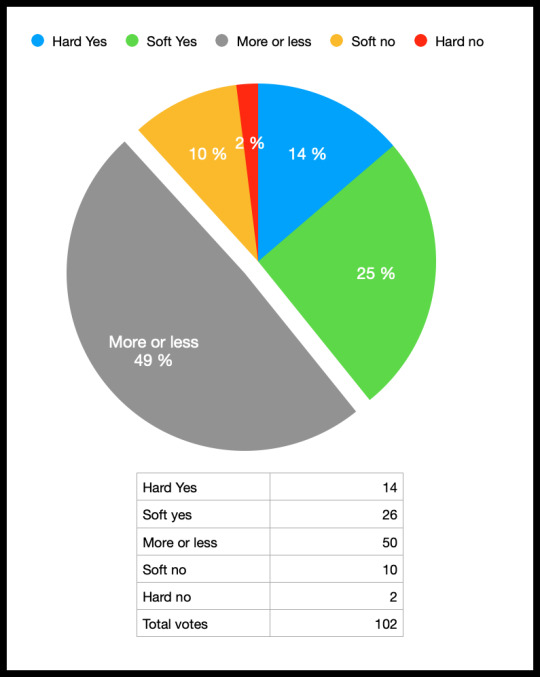
Personal Observation: Most of those who picked the Hard Yes (in survey as "Yes, AUs are my primary form of entertainment") were almost exclusively Throbb shippers (there was one thramsay person and one theyne person). I was surprised not to see Greysnow or Theonsa people pick it. Many of those who also chose that were particularly fond of the "Family issues, loyalty conflicts, inferiority complexes" option when they later chose what theme was most fundamental to Theon.
Pick a MILF for Theon

Personal Observation: I am first and foremost a Barbtheon believer but I can live with this too.
What themes do you consider most fundamental in Theon's story?
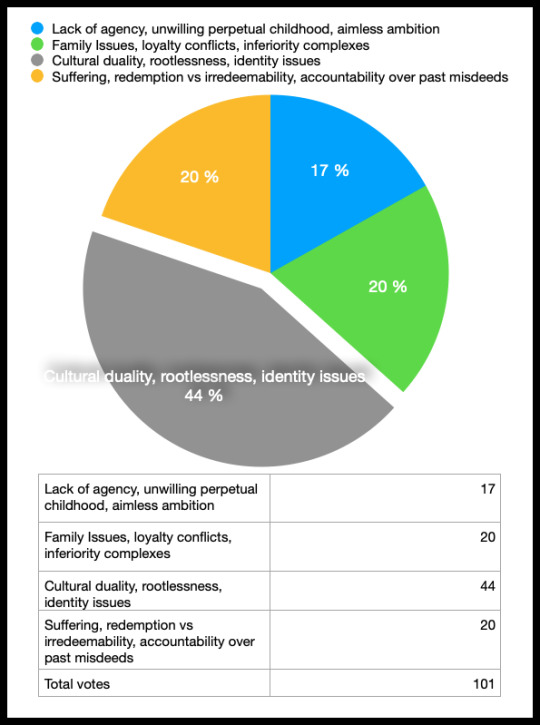
I am sorry this took so long and that it's not much! I don't like posting stuff from my phone and I was very busy today and now I am very tired and don't really have a lot of energy left. If there is anything else you are particularly interested in, please let me know.
#speaking#anonymous#thanks again! This has been encouraging and I like statistics too.#asoiaf#theon greyjoy#fandom related#theon survey
11 notes
·
View notes
Text
Ok. Some feelings on The Mandalorian season 3 where it stands for me right now. Yes it’s only been three episodes. Yes, I unfortunately have mainly not positive thoughts so far. So here we go.
TLDR: I feel what we’ve gotten this season is narratively weak, confused, and pointless.
The overarching issue, in all of it, is every conflict that’s been set up has been almost immediately resolved in the next episode or the same episode, no matter how big a space the plot point occupied previously. This has created a landscape of not only no stakes, but no realistic path for interesting character growth and direction for Din and Grogu, who are meant to be our protagonists.
Episode one starts us off with a ton of rehashing from the end of Mando S2 and TBoBF, things viewers keeping up should already know, since they’ve been restated many many times. On first watch this bothered me but I wrote it off as just some bumps as they ease us into the new story, but now it’s just. Fluff. We didn’t need another conversation with the Armorer about Din being forgiven, or to Bo Katan about their differences, etc. I liked the worldbuilding for Nevarro, but even that feels more like set dressing now.
The entire focus of the episode was around Din wanting IG-11 back so he could have someone to trust while going to find the living waters, and the ep ends with him on the beginning of an adventure to find a rare part to make that possible. This set up, while obviously just a writing choice to kick off a plot, still could’ve been a believably in character way to send Din on a long journey to various places and through conflicts in pursuit of something, on the way grappling with how focused he is on one way of things, and on what his faith and culture mean to him.
So like. Cool, interesting. Puts a focus on Din’s needs for trust and specificity, his stubbornness, and his perseverance towards an end goal, one that has been repeatedly shown and stated to be extremely important to him since the removal of his helmet multiple times in season 2 (forgiveness in the waters, which are supposedly destroyed). Also introduces the pirates as possibly being an enemy following him on this hunt for the rare part.
But then y’know.
Episode two starts, and he almost immediately gives up on that goal, gets a new random droid, finds out that Mandalore is liveable and not cursed and he didn’t need the droid anyway, and gets to the living waters within the same episode which is only the second of the season.
It immediately squashes any previously set up tension, goals, and conflict in a way that is jarring and frankly unsatisfying. We get some good Grogu focus, allowing him to come into the story and showing the inklings of conflict, but then the second half seems more focused on Bo Katan, and on Din being a passive thing to save. Not only that, but it resolves a goal that has been a motivator for Din and his character arc for so much of the show.
He bathes in the waters and is forgiven, but even then it is not his moment. He falls and Bo Katan saves him and there’s a beast in there. No lingering on what this moment means to him, on what finding out that Mandalore can be returned to means to him and his people, on what letting go of the weight of the sin he’s been carrying feels like. It’s just another rushed moment used for him to be in physical distress for someone else to act on and to introduce “big monster down there woah 👍” to the universe. We don’t even really get Grogu’s reaction to this, even though the previously set up stakes of Grogu having to save Din were fascinating and could’ve been an amazing beginning to a shift in dynamic or exploration of how Grogu interacts with conflict.
The episode doesn’t explore the full scope of the concepts it sets up for itself, and cuts short the scope of the waters plot like a check mark on a to do list. It also circles back and undoes the goals postured in the first episode, furthering the question of “what was the point of any of that?”
At the end of episode two I was already having some feelings. I was dissatisfied and confused, but still hopeful. I enjoyed some character beats, saw Din’s in-peril moments as kind of goofy and a switch up to how he’s usually portrayed, and it was only episode two.
But. Then episode three came out today and just. Come fucking on.
We start with the living waters plot over, boom. Again not really any talk or lingering on the significance of what just happened. Instead we focus on Bo Katan realizing there is actually something living down there, likely playing into her own plans and thoughts for the world, and they leave.
And get into a fight.
And this fight just. There is no direction. No stakes. They’re fighting because they’re the enemies Bo Katan has made but we know they’re going to be fine. And they are. The castle is destroyed and Bo Katan is mad but they just. Have to leave. Sets up an interesting plot for her grieving another home right? On dealing with that as Din brings her to the covert, right?
Nope! It’s. An entire unrelated episode in parentheses that we know the ending of before it starts because it is shown in the recap clips at the beginning of the episode.
We see some interesting moments of the rehabilitation process, about how large governments don’t actually do a good job of easing the transition and letting ex-empire people help, but the rest, I’ll say, didn’t fucking need to be there! It’s so unbelievably separate from Din, at least with what’s been presented to us this far, and it’s so long and just. Unenjoyable and lazy.
We know what’s going to happen, and it’s a slog as a result because we as the audience are not in Pershing’s shoes, not able to get invested and wonder if trusting Kane is right. We know every move she makes is a lie to get him to help the empire and to betray him, and as a result it just makes everything so painfully obvious and annoying and pointless feeling. It’s a plot that’s been done a thousand times, but usually! With the twist revealed to the audience as well, creating actual shock and emotional investment. I actually wondered if Kane would turn out to be good or to have a crisis of conscience, because it would’ve actually been unexpected as opposed to what was spelled out for us before it even started.
And in the end Pershing doesn’t even get to have that secret of betrayal with him to possibly come back as a plot point, to be someone and do something for this universe. Instead he’s strapped into a mind flayer and then just?? Allowed to be brain fried?? There is no explanation or background to how Kane has become so trusted as to not only not be questioned when leading a man out of town, but to be left alone with him IN THE CONTROL ROOM WITH THE CONTROLS! That also??? Are somehow allowed to be cranked up to dangerous levels with no security even though the device has supposedly been altered to be something else?? It’s. It’s so painfully predictable and set up and just. Pointless! What was any of that!
Like yes. I know this is going to come back later with whatever science tech Kane was able to get to continue Pershing’s experiments, whatever, but it was not relevant to the plot that we’ve so far been given, and absolutely did not have to be a monster sidequest sandwiched between the characters we actually are here to see and are meant to be experiencing this plot through. It could’ve been a longer arc, intercut and swapping with Din/Grogu/Bo Katan over a few episodes, resulting in the betrayal in a way that, while still would’ve been lazy for the content, would’ve been better paced and balanced with the rest of the story.
But that’s not all! When we cut back to Din and Bo Katan, we have yet another really interesting moment of meeting the covert, and of both of them being accepted. However the way that it’s framed seems to set up Bo Katan for having an arc this season, for struggling with her faith and seeing Din’s covert in a new light (or for the plot to try and push the cult idea further by having her feel like she’s being indoctrinated w care in a vulnerable spot which… I will be very pissed if they go for). And this is an interesting idea however! The protagonist/s are still Din and Grogu! And thus far, Din has been made to be almost completely passive and flat in his own show.
Episode one he is just wanting a robot, episode two he is in distress and gets saved, episode three he shoots some guys and gets back to his covert, but except episode one (which again was frankly just fluff and did not do anything for his character), he has not had any real sustained moment of plot focus and growth.
In the context of what we saw in episode two this makes me even more upset. This season set itself up to be and ideally should’ve been Din and Grogu’s reunion season, a time to see how they work and live and develop together, how Grogu’s partial but incomplete force/Jedi training affects his character and his relationships and alllows the plot to explore the potential of darkness or jealousy creeping in, of struggles with powers and steps towards being an accepted mandalorian. But instead things have just been. Flat and unfocused and pointless.
This season reads so far to me like the writers have run out of ideas on what to do with Din, on how to explore him on a plot and character level and how to shape a narrative around him. Like where does he have to go from here? He has Grogu back, he has his Mandalorian status back within his personal beliefs, he’s back with his covert, he’s not being actively chased by anyone who’s really a threat (at the moment) and there’s been no real talk of what him being Mand’alor means for the future of their group and his own need for training with the Dark Saber. That last point is the only thing that still feels unresolved, and yet it hasn’t been hinted at or leaned into so far as a direction they’re planning to go, besides once again showing Din can’t really use the Dark Saber for shit.
I feel like so much of this lack of focus is because they did a similar tying-up-big-possible-plots-and-arcs thing in TBoBF (which even though I know it’s been said a million times did not need to be mando s2.5) by wrapping up the Luke plot and the Grogu being separated plot. That should’ve been a whole season on its own, or hell, even a whole several season arc. I do not say this as someone who likes dinluke, because I do, but I’m actually more pissed at this from a writing and narrative perspective, because they brushed aside what feels to me like the most thematically elegant and emotionally conflicting plot they could’ve gone with like it was nothing.
Grogu has been built up as being both Mandalorian and Jedi. There has been focus on how Mandalorians and Jedi don’t get along. The dark saber was made by a Mandalorian Jedi when they did get along. Din now has the dark saber. There are so many obvious ties to be made about bridging that divide, about finding unity again, about working with the flexible points in culture and tradition as children create unique circumstances that force change.
We could’ve had a whole arc of Din being separated from Grogu and struggling with himself and working towards being forgiven, and Grogu getting trained and getting to have inner conflict and reflection, working towards realizations on both ends, a reunion, etc. It just! It was quite literally the logical and intentional direction at the end of season two, something so fascinating and nuanced to explore. But it was wrapped up like nothing, and it seems that that trend is all season three has decided to be.
I’m disappointed. I am still hopeful, because I love this show, and I want it to be good, and I want to see the characters expanded upon and developing with each other, but right now it feels like the narrative does not know it’s own direction and in fact hates every direction it tries to set itself in enough to immediately course correct into something else we don’t care about. It’s tiring, and it’s sad, because I don’t feel like I’m seeing the writing going downhill, I feel like I’m seeing that it already has, that the care and planning has already been sapped from the plot and world with no intention of improving. In retrospect, with context, it just feels so… flat.
I have hope, because of course I do, and it is still only the first three episodes, but I’ve also lost my trust, and no matter what happens next I want to explode the current writing with my mind.
#enjoy my essay I’m very mad and disappointed#the fruit is talking again#the mandalorian#the mandalorian spoilers#the mandalorian s3#the mandalorian season 3#din djarin#grogu
30 notes
·
View notes